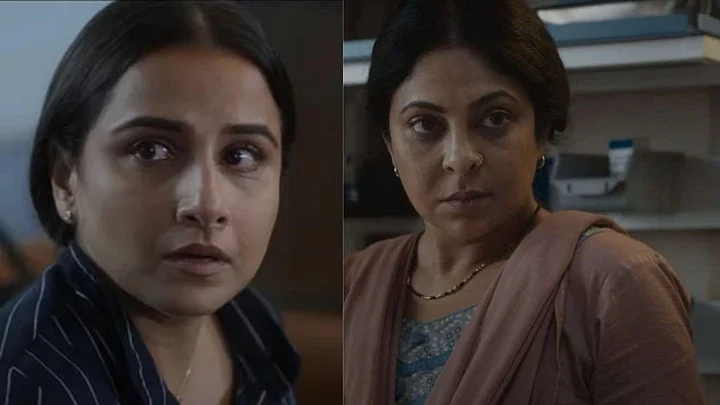Director Suresh Triveni who previously made Tumhari Sulu with Vidya Balan has her in the driver's seat literally and metaphorically in Jalsa. Maya, played by Balan, is a strong-willed, super popular journalist who even has her billboards up. She is never afraid to ask the uncomfortable questions, and as the movie begins, she gets embroiled in an unfortunate incident. This sets into motion a series of events that challenges nearly all characters and pushes them to confront their dilemmas.
The accident takes place right at the start. The sense of dread and foreboding tone is masterfully executed by editor Shivkumar V Panicker and DOP Saurabh Goswami. The “impact” is powerful and as viewers we are left a little shaken. It is not so much “a who dunnit” as an exploration of human character.
Who are we really when no one is watching? That’s the question Jalsa attempts to explore in this mostly gripping slow-burn drama. As we move from the swanky interiors of Maya Menon’s office to her upscale home we get a glimpse into Maya's life where we meet her son with special needs who is being looked after by her mother and cook Ruksana (played by Shefali Shah). We also have a narrative that comes alive with these brilliant actors.
Surya Kasibhatla is a young 10-year-old actor with cerebral palsy who plays Ayush with such warmth and sincerity that’s it’s a delight to watch him. Vidya Balan, Shefali Shah and Rohini Hattangadi-- three formidable actors make the film richer by their presence.
The screenplay by Prajwal Chandrashekar and Suresh Triveni is insightful even if not blindingly revelatory. They do well by not resorting to polemics. Ruksana and her family don’t enjoy the class privilege that cushions Maya and her world. As Ruksana’s son comes to spend the night at Maya’s elegant home from his cramped one-room house, it further underlines how different their spheres are. Maya has a camera installed in her house so she can check on her son throughout the day. Ruksana doesn’t have that luxury.
This story of two women working to support themselves and their families, of mothers bustling through their problems to protect their children and of individuals refusing to cower and survive at all costs has a bewitching quality to it. Jalsa is most arresting when we are in their midst.
However, as more characters are introduced and newer themes added it becomes a classic case of biting off more than you can chew. We have corrupt cops and powerful politicians, murky deals and gnawing guilt, however in trying to keep the proceedings austere and without dramatic highs we end up with a plot that feels contrived and characters that are half-baked.
In fact, even the denouement seems more staged for effect and that’s a pity because Jalsa held out such a great promise. The film comes alive and shines every time Vidya Balan and Shefali Shah share the frame. One is trying to hide something, the other searching for answers, one is defensive, eaten up by guilt and the other bristling with anger at how unfair life has been to her. Shefali Shah in particular has a spellbinding presence.
But the film flounders and never truly recovers when more themes are added. An indictment of socio-economic order, oppression, inequality takes away from the film’s solid core and blunts its impact. Jalsa isn’t so much about crime and punishment as it is about relationships and humanity. The stellar cast doesn’t disappoint and for most parts it holds our attention and for that Jalsa should be seen 3 QUINTS out of 5.
(At The Quint, we question everything. Play an active role in shaping our journalism by becoming a member today.)
